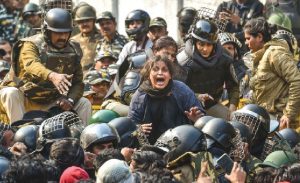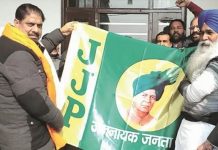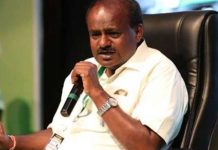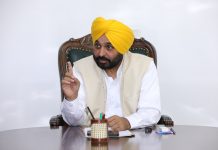 The very recently released videos of police brutality on the students of Jamia Millia Islamia well inside the university library, are enough to relay how very violent gets the very system which is supposedly there to protect and prevent!
The very recently released videos of police brutality on the students of Jamia Millia Islamia well inside the university library, are enough to relay how very violent gets the very system which is supposedly there to protect and prevent!
And for God’s sake let’s not get taken in by all those sarkari theories that these students were equipped with bricks or stones. In fact, in all the video footages, the students are looking visibly very tense and rattled and scared … with the cops raining blows in that savage way. The State and the police machinery under its control seemed all out to beat the students to pulp, break their bones, damage their vital organs with lathis and rods and what not!
And what left me stunned is the fact that last week, on February 10, several students (young men and women) of this same university were hit on their private parts, by the police force. This when they were trying to hold a protest march …a non–violent protest one, yet this level of police action!
Mind you, this is not the first time that I have heard of this barbaric policing tactic. To hit, where it hurts the utmost! And the damage inflicted can be so bad that one can be rendered deadened for life.
Right from the protestors at the Babri mosque destruction site at Ayodhya, to the reactionary riots that followed in Delhi’s Seelampuri area, to the pogrom in Ahmedabad in 2002, to the several riotous situations in Western Uttar Pradesh, to the arrested in the Kashmir Valley, several survivors have recounted to me that the police hit on their private parts.
This compels one to write that it’s about time we broaden and expand the very definition of rape. Rape can be of the psyche and soul too! And it’s double or triple whammy when the so-called protectors — the police force — hits on the private parts of our children. This amounts to rape — rape of the psyche and of the body and that of the soul. Imagine, being hit by the cops on your private parts and you can do little to take on the culprits!
Isn’t it shockingly ironical that these new form of rapes or semi- rapes are getting committed by the so called protectors!
LETS CLEAR MYTHS, URGENTLY REQUIRED!
As I have been writing all along, the anti CAA-NRC-NPR protest has dragged along fierce debates. You are this side of the fence or on the other side. Facades are done away with. And in this context, the Right- Wing lobbies are also throwing about wild allegations right from the appeasement propaganda, to Muslims did not suffer during that big round of the Partition.
Let me try clear this myth of Indian Muslims not suffering during the Partition. The stark truth is that they suffered severe setbacks. Let me detail at least some of them — I’d met and interviewed poet Nida Fazli and was reminded of the details he’d told me of how the Partition had changed the course of his life, “just before the Partition I got engaged to a woman I was in love with, but my family and also that of my fiancé’s, decided to migrate to Pakistan. I was determined not want to move from here and stayed had back, though went through a very turbulent lonely phase…Very painful years. My fiancé and nor did my family get back and I was all alone here …it only after several years of loneliness I found a companion in Mumbai.”
And as the late Qamar Azad Hashmi, writer and mother of activist Safdar Hashmi, detailed, “In common with thousands of people, my family was affected by the Partition; we had to even shift out of our home in Delhi and live in refugee camps set up in Humayun’s Tomb …And though initially I went with my family to Pakistan, but I returned the very next year and got married here… While my husband’s family had moved to Pakistan, he too was determined to stay put, though his business suffered tremendously after the Partition. We brought up our children in extremely tough financial conditions.”
And that legendary singer with that beautiful voice with a melancholic strain to it, Talat Mahmood, was again one of those Indians who did not want to shift to the newly carved country, Pakistan… His father, Manzoor Mahmood, owned an electric fittings cum a gramophone shop in Lucknow, and he was better known as the one who sang Iqbal’s popular taranaa at the Muslim League functions ‘Chino Arab hamara/ Hindoostan hamara…’ At the time of the Partition, Talat was in Calcutta with his elder sister, and though his entire family migrated to Pakistan, he and his sister opted to stay back in India.
This decision to be forever cut off from his immediate did affect him. As his niece, Rafia Hussain, had on an earlier occasion told me, “Temperamentally he could not adjust to the ways of the film world. Also, that initial shock that his entire family had migrated to a new country and would be settling down there for ever, had affected him to a certain extent …he was far too sensitive, he’d internalized that pain. But till the very end he was sure that he would never leave his home country …after all, he had opted to stay back at any cost.”
♦ ♦ ♦
In fact, several academics and historians have focused on the fact that hundreds and thousands of Muslims did not want to cross over to the new country, and stayed back. They opted to stay put in India. In his book, Muslims Against Partition,( Pharos Media), academic Shamsul Islam, has focused on this fact, that is, a large number of Muslims were not supportive of the creation of Pakistan.
To quote him, “It is true that India was partitioned in 1947 due to Muslim League’s demand for a separate homeland for Muslims. And there is no denying the fact that the Muslim League was able to mobilize a huge mass of Muslims in favour of its demand. But it is also true that a large section of Muslims and their organizations stood against the demand for Pakistan. These Muslims against the Partition challenged the Muslim League theoretically and confronted the latter on the streets.”
He has also dwelt on an crucial offshoot– The Partition of India created a serious identity crisis for Indian Muslims…And as historian Muhammad Mujeeb commented that after the Partition, Muslims “became a smaller minority in India, physically not less, but more vulnerable, by the creation of the separate state of Pakistan, with their loyalties obviously open to suspicion and doubt, and their future nothing but the darkness of uncertainty.”
And as historian Mushirul Hasan detailed, “Partition was a nightmare. The so called Islamic community in India which had no place in Jinnah’s Pakistan was ‘fragmented’, ‘weakened’ and left vulnerable to right-wing Hindu onslaughts. Despite a creation of a separate Homeland for Muslims, India remained home to a large number of Muslims.
“Those who remained in India have consistently had their loyalty to India questioned by the Hindu Right or Hindutva camp. The Bible for the Rashtriya swayamsevak Sangh cadres, Bunch of Thoughts, the compilation of the writings of RSS ideologue M.S. Golwalkar,contains a long chapter, titled ‘Internal Threats’ in which the Indian Muslims are described as threat number one.”
And to quote diplomat-author,Pran Nevile, from his memoir ‘Carefree Days: Many Roles, Many Lives’, this particular paragraph which details of how Muslims living in Delhi were attacked around the Partition phase: “By the beginning of September 1947, Delhi was flooded with refugees from Punjab. There was an acute shortage of housing in Delhi. The exodus of about 2,000 officers and clerks more than balanced the influx of over 3,000 from Pakistan comprising the staff of the railways, Posts and Telegraph department and other central government officers who had decided to opt for India…I was then living as a sub-tenant of a Punjabi family in the Western Extension Area, a new residential complex off Pusa Road which had come up during World War II…By the first week of September, with the influx of over a lakh of refugees in Delhi, the communal situation became tense…I vividly remember how a bulk of Muslim families were driven out of their homes on Ajmal Khan Road and some other areas of Karol Bagh.
“Here I would like to cite the case of a Muslim family, our immediate neighbours whom we managed to protect. A family of three, Mr. Khan, an executive engineer, his wife and grown up daughter were occupying the government-requisitioned house. Some anti-social elements and groups of refugees were actively involved in attacking Muslim houses identified by local goons.
“It was on the night of 7 September that we came to know their house could be attacked in the morning. We gave them shelter for the night and early in the morning, our neighbour, a Sikh gentleman, drove Mr Khan’s car and took his family safely to the Imperial Hotel on Queensway.
“An hour later, the house was ransacked by the goons, who rebuked us for aiding in their escape.”
letters@tehelka.com













